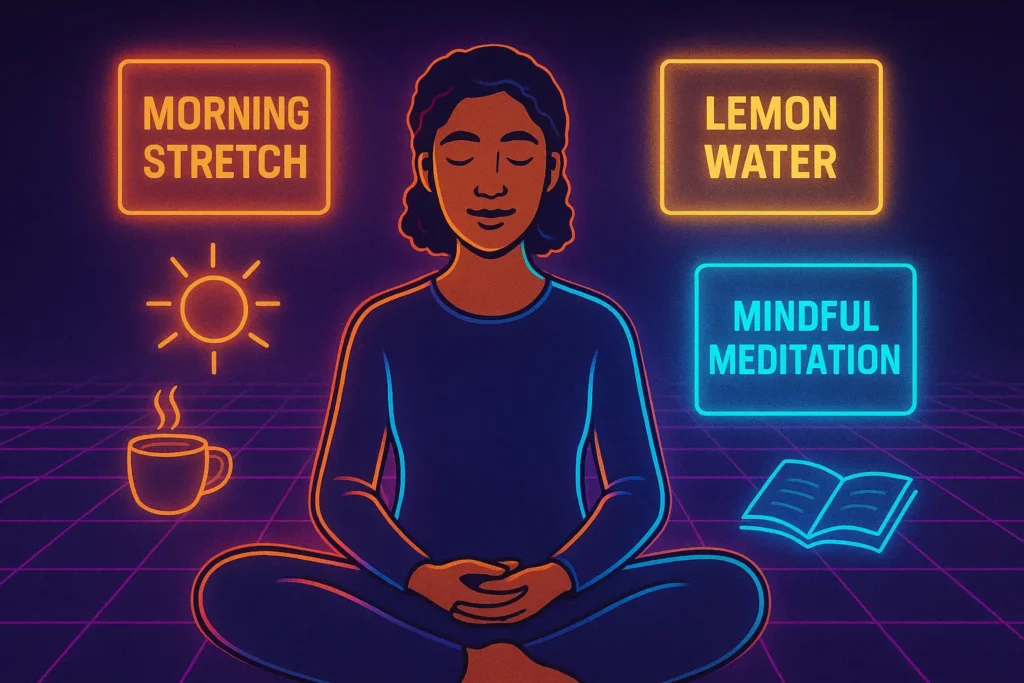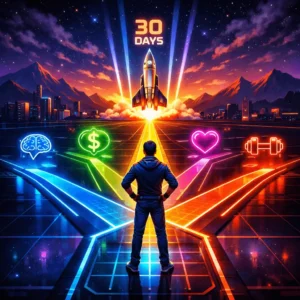Do you ever feel like you’re constantly chasing the next big thing? The promotion, the relationship, the house upgrade—only to find that achieving these goals doesn’t bring the lasting happiness you expected?
I found myself in this endless pursuit cycle a few years ago. Working 60-hour weeks for a corner office that, once obtained, just left me wondering, “Is this it?” The revelation came from an unexpected source: my grandfather’s journal, discovered while cleaning out his home after his passing.
Every day for 40 years, he had written down three things he was grateful for. Not grand achievements or expensive purchases, but simple moments: “Coffee with Margaret,” “The cardinal outside my window,” “The feeling of finishing a good book.”
His life hadn’t been easy—he’d survived war, lost his wife too young, and faced countless hardships—yet his journals revealed a man who experienced profound joy and contentment. The secret? He had mastered the art of noticing and appreciating what was already present in his life.
Science confirms what my grandfather intuitively understood. A groundbreaking study published in the Journal of Personality and Social Psychology found that participants who kept a list of things to be grateful for reported 25% higher levels of happiness, were more optimistic about the future, and even experienced fewer physical ailments compared to control groups.
But here’s the challenge: in our notification-saturated world, how do we train ourselves to notice the abundance already present in our lives? How do we transform gratitude from a nice concept into an automatic daily habit?
In this comprehensive guide, you’ll discover:
- List of things to be grateful for, categorized for maximum impact
- A science-backed system to make gratitude automatic within 21 days
- How to use AI to create a personalized gratitude practice that sticks
- Real stories of how this practice has transformed lives
Read: Fun Gratitude Activities for Adults
Why Keeping a List of Things to Be Grateful For Matters
What we focus on expands. Neuroscientists call this “selective attention,” and it has profound implications for our happiness. When you actively search for things to be thankful for, your brain literally rewires itself to spot more positive aspects of your reality.
Dr. Robert Emmons, the world’s leading scientific expert on gratitude, explains, “Grateful people experience higher levels of positive emotions such as joy, enthusiasm, love, happiness, and optimism.” His research shows that practicing gratitude actually changes brain function in areas associated with moral judgment, emotional processing, and even reward pathways similar to those activated by certain medications.
This neural reconfiguration doesn’t just feel good—it transforms your health. Regular gratitude practice has been linked to:
- 10% lower blood pressure
- Enhanced immune function
- 30% reduction in depressive symptoms
- Better sleep quality and duration
- Increased resilience to stress and trauma
When wondering what are things to be grateful for in your own life, remember that the act of searching itself is transformative, regardless of what you find.
How Gratitude Transforms Every Area of Life
Think of gratitude as the pebble that creates widening circles across the pond of your life. What starts as appreciating your morning tea or a friendly text message gradually transforms how you experience:
- Work: You begin noticing growth opportunities and supportive colleagues rather than just deadlines and difficulties
- Relationships: You appreciate the unique qualities in others instead of focusing on their shortcomings
- Health: You feel thankful for what your body can do rather than criticizing its limitations
- Challenges: You see learning opportunities where you once saw only obstacles
This perspective shift isn’t about denying difficulties—it’s about expanding your awareness to include the full spectrum of your experience, especially the positive aspects that are easy to overlook when you’re busy or stressed.
100 Things to Be Grateful For (By Category)
When people ask what are 10 things to be grateful for, they’re often thinking too narrowly. This comprehensive list will expand your gratitude horizons and provide specific prompts for your daily practice.
Daily Comforts & Simple Pleasures (20)
The foundations of our everyday experience often go unnoticed, yet these small comforts form the fabric of a pleasant life. Here are unique things to be thankful for in your daily routine:
- The first sip of your morning beverage
- Hot running water for showers
- A comfortable bed and clean sheets
- The smell of freshly baked bread
- Laughter that comes unexpectedly
- The weight of a warm blanket on a cold night
- Finding money you forgot in a pocket
- The satisfaction of completing a task
- A perfectly ripe piece of fruit
- Air conditioning on hot days
- Heating on cold days
- The feeling after a good stretch
- The smell of fresh laundry
- A good hair day
- The moment when traffic finally clears
- Finding the perfect parking spot
- The silence when you turn off notifications
- The relief of taking off uncomfortable shoes
- A meal that exceeds expectations
- The sound of rain when you’re cozy inside
Physical Health & Bodily Gifts (15)
Our bodies perform countless miraculous functions every second without conscious effort. When considering what I am thankful for, my physical capabilities deserve special recognition:
- Lungs that breathe automatically
- A heart that beats tirelessly
- Eyes that can perceive millions of colors
- The ability to taste different flavors
- Ears that can hear music and loved ones’ voices
- The healing capacity of your skin
- The strength to carry groceries
- Energy to play with children or pets
- The coordination to dance or exercise
- The relief of pain subsiding
- The pleasure of a deep breath
- The refreshment of drinking cold water
- The satisfaction of a good night’s sleep
- The ability to move without assistance
- The immune system fighting off illnesses
Read More: 12 Stages of Burnout
Technological Conveniences (15)
These modern innovations save time, enhance communication, and improve quality of life in ways our ancestors couldn’t imagine:
- Smartphones that connect us instantly
- Search engines that answer almost any question
- Navigation apps that prevent us from getting lost
- Online shopping delivered to your door
- Digital photos that preserve memories
- Streaming services with endless entertainment
- Home appliances that save hours of labor
- Medical advances that extend and improve life
- Video calls with distant loved ones
- The ability to work remotely
- Digital calendars that keep us organized
- Online learning opportunities
- Customer reviews that help with decisions
- Music streaming for any mood or occasion
- Digital payments that simplify transactions
Natural World Wonders (15)
Nature offers boundless beauty and inspiration that can elevate our spirits just by paying attention:
- Sunrises that promise new beginnings
- Sunsets that paint the sky
- The phases of the moon
- Seasonal changes and transitions
- The geometry of snowflakes
- The variety of flowers and plants
- The sound of ocean waves
- The majesty of mountains
- The cooling shade of trees
- The resilience of wildlife
- The intricate patterns in leaves
- The nourishment provided by soil
- The cleansing power of rain
- The warmth of sunshine
- The grand tapestry of stars at night
Personal Growth & Inner Resources (15)
Some of the most valuable things to be grateful for aren’t external at all, but rather the inner capacities that help us navigate life:
- The ability to learn from mistakes
- Resilience after setbacks
- Your capacity for compassion
- The freedom to make choices
- The courage to try new things
- The wisdom gained from experience
- Your unique perspective on life
- The ability to forgive (yourself and others)
- Skills you’ve developed over time
- Times you’ve grown through challenges
- Your creativity and imagination
- The ability to find humor in difficult situations
- Your personal values and principles
- The intuition that guides your decisions
- The patience you’ve developed over time
Human Connections (10)
Relationships form perhaps the most meaningful category when reflecting on what are some things to be grateful for:
- Family members who know your history
- Friends who accept you fully
- Mentors who’ve guided your path
- Partners who support your dreams
- Children who show you new perspectives
- Colleagues who share your burdens
- Teachers who believed in your potential
- Strangers who’ve shown unexpected kindness
- Communities that provide belonging
- The diversity of perspectives around you
Read More: How to Start a Hard Conversation
Personal Freedoms & Opportunities (10)
Many of the freedoms and possibilities we enjoy represent the culmination of centuries of human struggle:
- The right to express your opinions
- Access to education and information
- The ability to vote and participate in democracy
- Religious or spiritual freedom
- Economic opportunities to improve your situation
- The chance to travel and explore
- The freedom to choose your path in life
- Access to arts and cultural experiences
- The ability to help others and make a difference
- The opportunity to live with purpose and meaning
Read More: A Life Worth Living
Creating Your Unstoppable Gratitude Habit
Knowing what to be grateful for is only half the equation. The real challenge is transforming this knowledge into a consistent daily practice. Here’s a science-backed system that makes building your gratitude habit almost effortless.
Step 1: Make It Obvious
Environment design is crucial for habit formation. When thinking about what are 10 things to be grateful for today, having visible reminders can make all the difference. Try these strategies:
- Place a gratitude journal somewhere unavoidable (nightstand, coffee table)
- Set a daily phone wallpaper with the prompt “What am I grateful for today?”
- Leave sticky notes on your bathroom mirror or refrigerator
- Create a dedicated “gratitude spot” in your home
- Use existing daily triggers (brushing teeth, coffee brewing) as cues
AI PROMPT:
“Help me identify perfect places in my daily routine to insert a 30-second gratitude practice. I’ll describe my typical day, and I’d like you to suggest 3 specific moments when I could pause to note things I’m grateful for.”
Step 2: Make It Effortless
Reduce friction by simplifying your gratitude practice to the point where it feels almost too easy:
- Start with just ONE thing you’re grateful for daily
- Use voice memos instead of writing if that’s easier
- Create a one-minute “gratitude ritual” linked to something you already do
- Keep gratitude notes in the same app you use most often
- Create a simple “things to be grateful for” template
AI PROMPT:
“Based on my preferences, help me design a minimalist gratitude practice I can complete in under 60 seconds daily. I prefer [writing/speaking/visual methods] and typically have the most energy in the [morning/afternoon/evening].”
Step 3: Make It Satisfying
The brain learns through immediate rewards. Make your gratitude practice instantly rewarding:
- Pair it with something you enjoy (favorite drink, music, location)
- Create a simple tracking system to build visual momentum
- Share one grateful moment daily with someone you care about
- Notice the immediate mood boost after your practice
- Create small celebrations for streaks (3 days, 7 days, 30 days)
AI PROMPT:
“Help me create a reward system for my gratitude practice. What are 3 small, immediate rewards I could give myself after each session, and 3 bigger rewards for reaching milestones (weekly, monthly)?”
From Struggle to Transformation: A Real Story
Michael, a 34-year-old software developer, was skeptical when first challenged to create a list of things to be grateful for. “I thought it was fluffy nonsense,” he admits. “But I was burned out and desperate enough to try anything.”
He started small—just 30 seconds each morning noting one thing he appreciated while waiting for his coffee to brew. “The first week felt forced,” he recalls. “But by week two, something shifted. I started noticing these small perfect moments throughout my day that I’d been completely missing.”
After a month, colleagues commented on his improved mood and energy. After three months, he reported lower anxiety levels and better sleep. “The biggest surprise,” he says, “was how it transformed my relationship with my teenage daughter. Instead of focusing on her messy room or screen time, I started noticing her creativity, her humor, her kindness to our dog. Our whole dynamic changed.”
Michael’s experience mirrors what research consistently shows: a regular gratitude practice doesn’t just make you feel better—it fundamentally changes how you perceive and interact with the world around you.
Read More: How to Take Action
Conclusion: Things to Be Grateful For
While creating a list of things to be grateful for is powerful, maintaining consistent practice over time is where most people struggle. The initial enthusiasm fades, life gets busy, and even the simplest habits can fall away without the right support system.
Imagine having a personalized coach that:
- Understands your unique personality and schedule
- Provides daily customized prompts aligned with your values
- Makes gratitude practice feel like an engaging game
- Celebrates your progress in meaningful ways
- Evolves with you as you grow
Introducing the AI Habits Coach —a revolutionary approach to making gratitude and other life-changing habits not just stick, but become an enjoyable, automatic part of who you are.
This science-backed system combines AI-powered personalization, behavioral science, and gamification to transform the way you build habits. It’s not just about knowing what to be grateful for—it’s about rewiring your neural pathways to automatically notice the good all around you.






